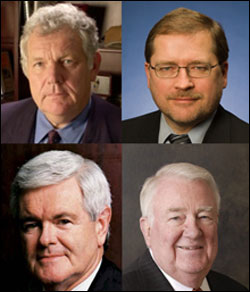
CELL BLOCK GOP Criminal-justice reform, once a traditional cause of the left, has drawn the attention of such iconic conservatives as (clockwise, from top left) William Bennet, Grover Norquist, Ed Meese, and Newt Gingrich. |
The practical result of the new spirit of political civility is still an open question, but there is one area where small-government conservatives and do-gooder liberals might really be moving toward significant policy agreement, compromise, and action: criminal-justice reform.With the spotlight on bigger issues of economy, war, and health care, this usually hot-potato issue is arguably getting more serious attention than it has in years. Policy makers are trying to determine what really reduces crime and what doesn't — and how we might shift from simply locking up as many people as possible to a more effective, and cost-efficient, model.
It's a subject long thought to be the purview of liberals. But now, conservatives are helping to drive this backstage discussion — and not just any conservatives, but right-wing icons like Newt Gingrich, William Bennett, Ed Meese, and Grover Norquist, to name a few.
They are not all newcomers to criminal-justice reform. But a month ago, for the first time, they teamed up to form an organization — Right on Crime — that will advocate the way conservative foundations have previously done on such issues as gun rights, low taxation, and restriction of abortions.
Longtime activists — most of them liberals — tell the Phoenix that Right on Crime could be a game-changer, just what's needed to find bipartisan consensus on new policies — even if left and right are coming to the same answers through very different motivations.
And that they are. Left-leaning groups tend to be seeking justice and fairness for the underprivileged who disproportionately get caught in the tentacles of America's prison system.
These conservatives, by contrast, are driven by a desire to shrink government spending; a libertarian view toward decriminalizing personal behavior; and a belief in faith-based rehabilitation programs.
"Their number-one concern is that the criminal-justice system is a bloated big-government program that has run amok," says Julie Stewart, executive director of Families Against Mandatory Minimums in Washington. "And frankly, I agree with that."
It's making for some odd collaborators. Long-time reform advocates are expressing guarded optimism that this new right-wing effort might change the political calculus that has long impeded their efforts. But at the same time, they are skeptical of what these conservatives are really up to.
"We're optimistic," says Jennifer Bellamy, criminal-justice lobbyist for the American Civil Liberties Union in Washington, "but we're also realists."
BUDGET-DRIVEN SMARTS
There have always been some voices for reform on the right, and conservative lawmakers have crossed over at times, including on the 2010 Fair Sentencing Act, which reduced the disparity between punishment for powder and crack cocaine.
But the timing is right for a much bigger engagement, particularly at the state level, where newly elected Republican governors and legislators are facing financial crises. Suddenly they're willing to consider "smart on crime" policies that can reduce the corrections budgets that have soared unchecked for decades.